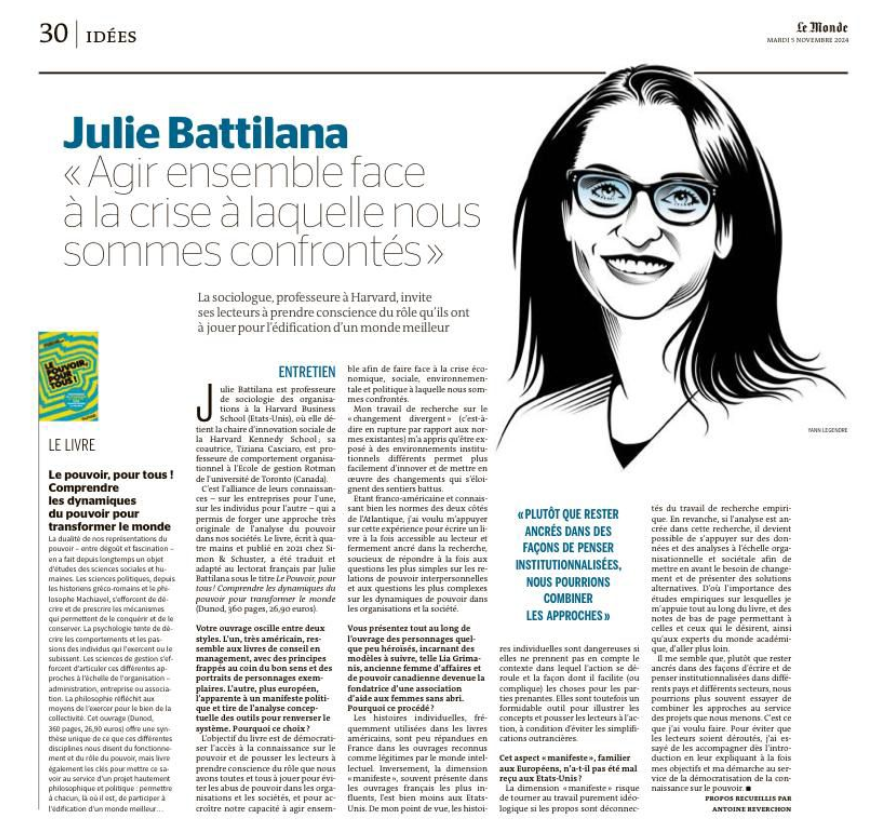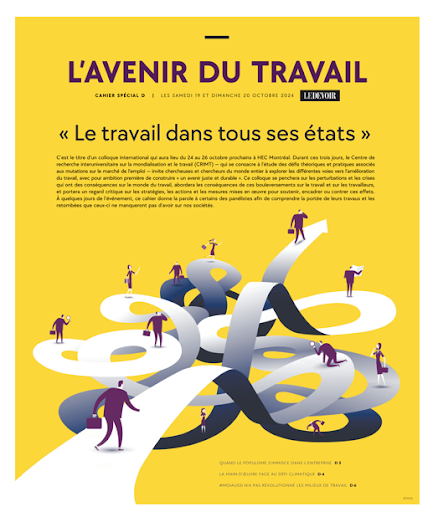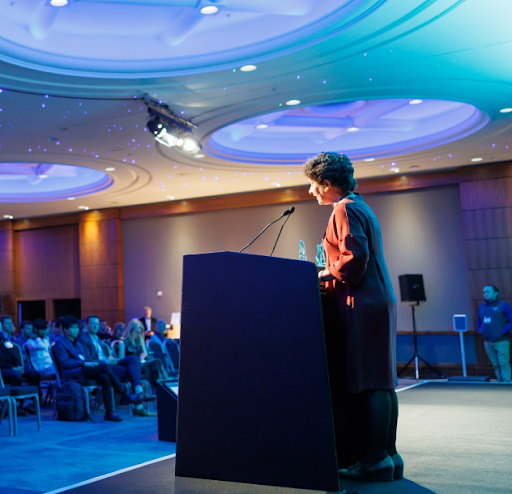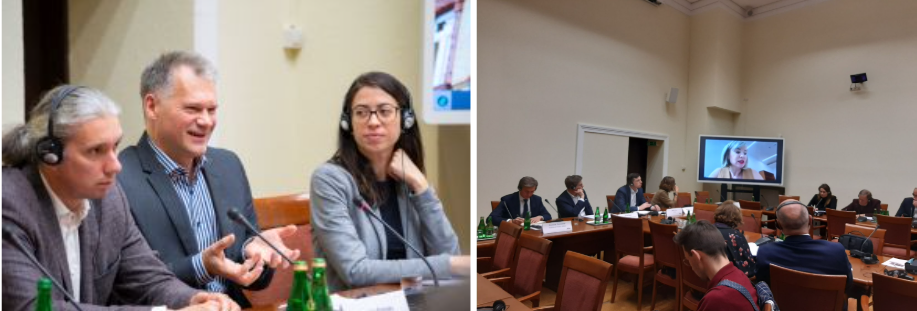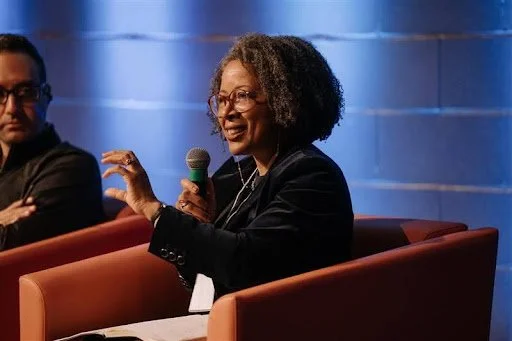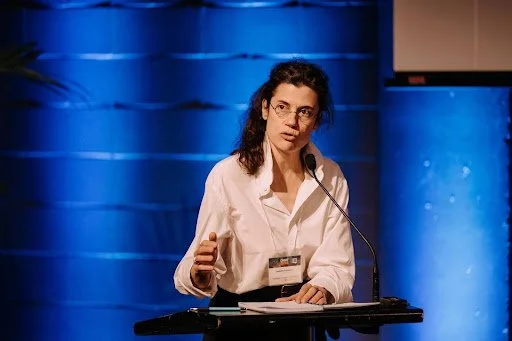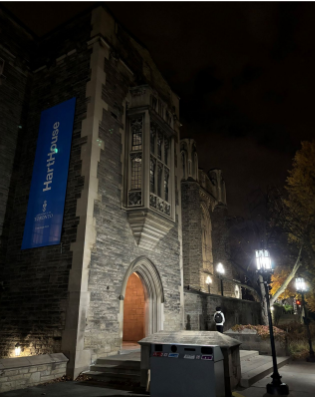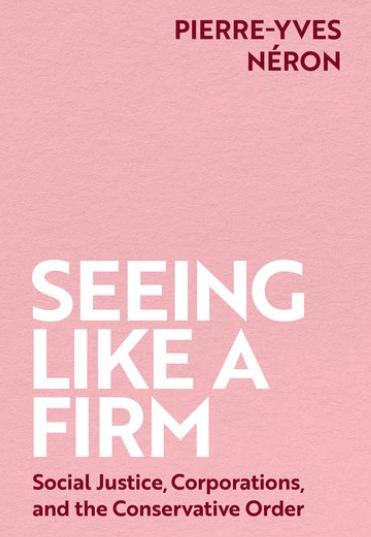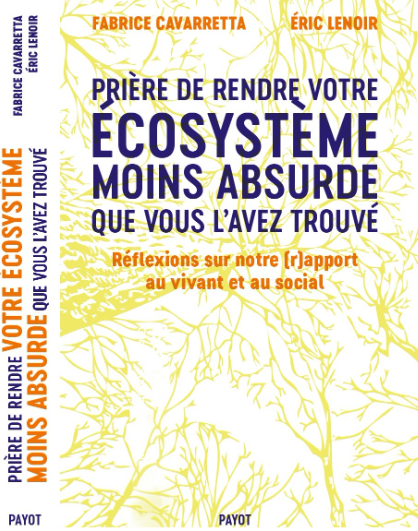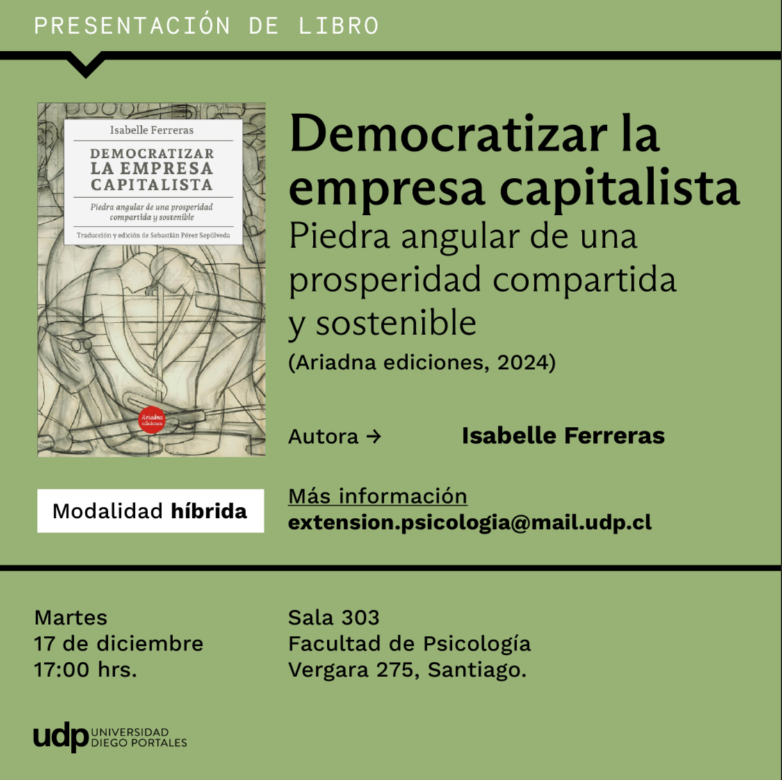#DW Newsletter #7
October - November 2024
Dear signatories of the #DemocratizingWork Manifesto,
Dear Isabelle Ferreras,
The battle for a democratic and sustainable future has reached another milestone as Donald Trump and Elon Musk have managed a seemingly successful merger and acquisition of the USA... Meanwhile, threats against the independence of academic research and teaching institutions are on the rise. In this context, our global network, which seeks to leverage scientific research in the service of helping societies to ensure a better future for all – through democratizing work, decommodifying labor, and decarbonizing and remediating the planet is more essential than ever.
What happened in the last 2 months? Remember that this information-sharing tool we initiated a year ago is your tool: a tool meant to help us disseminate recent research results, relevant debates, and actual progress within and around our global network with Democratizing, Decommodifying, and Decarbonizing Work! Please share updates from your end.
Our #DW Global Workshop Series Continues
JANUARY, 30 please join us to continue the global conversation at the crossroad of the 3 principles. This session will focus on how legal frameworks can drive equity and fight discrimination in the workplace and the so-called “labor market”, as outlined in the recent report to the Canadian Government, A Transformative Framework to Achieve and Sustain Employment Equity (2024).
We are thrilled to hear from Adelle Blackett of McGill University (#DW core group member), Chair of the commission that drafted the report, who will share key insights from its findings.
The session will also include perspectives from Jeannine Van der Rheede, Lecturer in Mercantile and Labour Law at the University of the Western Cape, Chairperson of the Law Faculty’s Employment Equity Committee, and member of the University’s Employment Equity Forum, Marie Clarke Walker, Principal at Marie Clarke Walker Consulting Inc., and former leader with the Canadian Labour Congress (CLC) and the International Trade Union Confederation (ITUC) and Ana Virginia Gomes, ILO Regional Director for Latin America and the Caribbean.
Watch the recordings of last year workshops via the #DemocratizingWork dedicated webpage
IN THE NEWS
France - Julie Battilana with Le Monde on empowering collective action in times of crisis
In a recent article in Le Monde (November 4), Julie Battilana, #DW core group co-founder, emphasizes the need to enhance our collective capacity to act in response to the current multifaceted crises. Drawing on her expertise, Battilana argues that strengthening civic and organizational agency is essential for navigating current challenges, from social inequalities to environmental degradation. Her insights underscore the importance of fostering empowerment at all levels -including in firms and in the workplace, to drive meaningful change.
UK Oxford University - Isabelle Ferreras with AI Ethics At Oxford Blog on Current AI Challenges to the Future(s) of Work
As a Distinguished research fellow of the Institute for Ethics in AI (Oxford University), Isabelle Ferreras co-authored this piece « Current AI Challenges to the Future(s) of work » with Jeremias Adams-Prassl (Professor of Law and Associate Dean, Faculty of Law; Senior research associate of the Institute for Ethics in AI, Oxford University), Sharon Block (Professor of Practice and Executive Director, Center for Labor and a Just Economy, Harvard Law School) and Michelle Miller (Director of Innovation, Harvard Center for Labor and a Just Economy).
This new blog post examines the transformative impact of artificial intelligence on labor. It examines the rise of algorithmic management, highlighting the risks of worker exploitation, intensified surveillance, and systemic inequalities. The authors advocate for democratizing AI development and deployment, emphasizing ethical integration that centers worker rights, transparency, and fairness. Through the title for this piece,« Future(s) of Work, » the authors seek to insist on the idea that no trajectory of AI development and deployment in the workplace is inevitable. They join calls for proactive rethinking of workplace technologies, and call for inclusive and democratic governance to shape equitable and pluralistic futures of work grounded in the study of current hopeful developments that they survey across the EU and the US.
USA - Julie Battilana with USA TODAY about the creation of the Power, Innovation, and Leadership executive education program to empower black girls and women in the south
Learn about the Power, Innovation, and Leadership executive education program, developed by the Social Innovation + Change Initiative at Harvard Kennedy School in collaboration with LaTosha Brown and the TruthSpeaks Innovation Foundation. Led by Julie Battilana (#DW co-founder), this unique program empowers leaders dedicated to advancing opportunities for Black girls and women in the South. Recently highlighted by Deborah Barfield Berry in USA TODAY, the inaugural cohort exemplified the impact of these inspiring female leaders.
The Netherlands - Isabelle Ferreras with The Groene Amsterdammer on why corporations prioritize shareholder value and the need to revive economic democracy
In a recent article for De Groene Amsterdammer, Isabelle Ferreras discusses why shareholders wield disproportionate power in corporations and how progressive movements have sidelined the ideal of economic democracy. The article reflects on the influence of Milton Friedman’s seminal 1970 New York Times essay, where he argued that a corporation’s sole purpose is to maximize shareholder value. This "Friedman Doctrine" set the stage for decades of corporate focus on stock prices at the expense of workers, communities, and environmental sustainability.
Ferreras examines how these ideas have shaped today’s corporate priorities and calls for a renewed focus on economic democracy and worker power in the government of firms.
Canada - Isabelle Ferreras dans Le Devoir sur la nécessité de rétablir la démocratie au travail
Dans une interview récente pour un Cahier Spécial du journal Le Devoir à l’occasion du colloque du CRIMT qui s’est tenu à l’Université de Montréal les 24-26 octobre dernier, Isabelle Ferreras et Mathieu Dupuis (professeur en relations du travail au Département des relations industrielles de l’Université Laval) abordent le déficit démocratique dans les entreprises canadiennes, particulièrement dans un contexte marqué par les changements technologiques et la mondialisation.
Charles Tremblay Potvin, professeur spécialisé en droit du travail à l'Université Laval, revient sur des exemples locaux comme les conflits de travail chez Walmart et Québecor qu’il a étudiés, pour illustrer comment les pratiques actuelles érodent les droits de citoyenneté acquis par les luttes syndicales des XIXe et XXe siècles. Ce débat fait écho aux thèses développées dans son ouvrage Democratizing the Corporation: The Bicameral Firm and Beyond (2024), où Ferreras propose une réforme radicale de la gouvernance d'entreprise : le bicamérisme économique. Dans cette vision, les travailleurs, en tant qu'investisseurs de leur personne, auraient une place à la table des décisions aux côtés des actionnaires.
Ce cahier spécial du Devoir témoigne de la pertinence grandissante grandissant des enjeux portés par notre réseau #DemocratizingWork également au Canada.
EVENTS
OCTOBER 19-22, ISTANBUL - Strategic Management Society Annual Conference : The gendered impact of job insecurity on the transition from wage employment to entrepreneurship
Imge Kaya-Sabanci (#DW core group member) presented her research results on the gendered impact of job insecurity on the transition from wage employment to entrepreneurship at the Strategic Management Society Annual Conference, held in Istanbul from October 19-22. Using Spanish administrative linked employer-employee datasets and the 2012 labor market reform as a shock, her study offers evidence supporting the hypotheses that a decrease in job security within wage employment increases individuals' entries into entrepreneurship, and that this effect is stronger for women than for men, highlighting gendered differences in labor market experience. This research contributes to the relevance of a career-path approach to entrepreneurship, and informs female-centered policies to labor market flexibility, job insecurity. These insights provide actionable data to advocate for more equitable labor practices and entrepreneurial opportunities.
OCTOBER 22, POLAND - ETUI and IPA: Towards a policy agenda to democratise companies in Poland: revisiting worker representation on boards.
The ETUI and the Institute of Public Affairs (IPA), alongside the Parliamentary Club "The Left" of the Polish Parliament, organized a seminar marking the first anniversary of Poland's 2023 elections, focused on deepening democracy through workers' participation in company boards. This event was organized by Sara Lafuente Hernandez (#DW core group member) who played a pivotal role in coordinating the seminar.
This event, inspired by ETUI’s upcoming book Revisiting Worker Representation on Boards: The Forgotten EU Countries in Codetermination Studies, explored the social significance and future of codetermination in peripheral European economies, including Poland. The seminar featured three panels: an academic review of the book, a discussion with Polish social partners on worker representation experiences, and a policy-focused panel examining pathways for expanded workers' rights at both the national and EU levels.
OCTOBRE 24 - 26, CANADA - CRIMT et HEC Montréal : Le travail dans tous ses états
Le Projet de partenariat du CRIMT (Centre de recherche interuniversitaire sur la mondialisation et le travail ) sur l’expérimentation institutionnelle et l’amélioration du travail organisait un important colloque international intitulé : Le travail dans tous ses états.
“Améliorer le travail pour un avenir juste et durable”. Ce colloque s’est penché sur les perturbations et les crises qui affectent le monde du travail, a abordé les conséquences de ces bouleversements sur le travail et sur les personnes au travail, et a porté un regard critique sur les stratégies, les actions et les mesures mises en œuvre pour soutenir, encadrer ou contrer ces effets.
Hosted by the CRIMT conference, a Forum was especially focused on addressing the issue: if and how firms can be made sustainable, ethical and democratic? Bringing together leading thinkers and actors, it draws on recent initiatives including the introduction of Bill C-285 (The 21st Century Business Act) in the Senate of Canada, the adoption of Bill C-50 (the Canadian Sustainable Jobs Act) and ongoing debates on the potential role of corporate reform in achieving democratic, sustainable, prosperous and just societies.
We are pleased to offer you exclusive access to the recording of the forum The Corporation of the Future: Is there a Roadmap to “Common Good” Capitalism?
Chair: Isabelle Martin (Université de Montréal), Isabelle Ferreras (UCLouvain), The Honorable Senator Hassan Yussuff, Jérôme Lussier (Director of Parliamentary Affairs, Office of Senator Julie Miville-Dechêne), Joel Bakan (University of British Columbia)
NOVEMBER 13 - 14, MADRID - Spanish Ministry of Labour and Social Economy: International Labour Congress: towards a Labour International
The International Labour Congress, organized by the Spanish Ministry of Labour and Social Economy, took place on November 13-14, 2024, in Madrid. The event gathered around 400 high-level participants from governments, international organizations, universities, trade unions, and civil society groups to address pressing global labor issues. Focused on both the Global North and the Global South, the congress advanced discussions on topics such as workers’ rights, the impact of technology, the climate emergency, and gender equality in the workforce.
Featuring four key sessions, Isabelle Ferreras moderated the first, entitled, « Safeguarding the Power of Workers and Trade Unions in the Workers’ Statutes of the 21st Century – Towards a True Democracy at Work. » This session addressed the critical need to strengthen workers’ rights and trade union power in an evolving global economy. The panel was composed of seven distinguished speakers, Sarah Jaffe, journalist and author of the groundbreaking book ‘Work Won't Love You Back’, Li Andersson, Chair of the Employment and Social Affairs Committee of the European Parliament, Luka Mesec, Deputy Prime Minister and Minister of Labor, Family, Social Affairs, and Equal Opportunities of Slovenia, Joaquín Pérez Rey, Secretary of State for Labor of Spain, Míriam Roquel, Minister of Labor and Social Welfare of Guatemala, Oliver Röpke, President of the European Economic and Social Committee (EESC) of the European Union, and Antonio Baylos, Emeritus Professor of Labor Law and Social Security at the University of Castilla-La Mancha (UCLM). Director of the ‘Journal of Social Law’. There was also a crucial intervention from Maurizio Landini, General secretary of the Italian General Confederation of Labour.
Professor Ferreras concluded the session by emphasizing the need to democratize work to offer a constructive response to the challenge that Karl Polanyi termed, the ‘fascist solution,’ to the violence exercised by capitalism over society. As delineated, empowering the working class and reforming the corporate structure is vital to ensuring democratic and planetary survival.
Here is the video recording of Isabelle Ferreras' panel, along with the rest of the sessions from the first day of the congress:
NOVEMBER 28, CANADA - University of Toronto : Whither the Transformative Framework to Achieve and Sustain Employment Equity, One Year Later? | 2024 Sefton-Williams Memorial Lecture
On November 28, 2024, the Sefton-Williams Memorial Lecture featured Professor Adelle Blackett of McGill University (#DW core group member) as she delivered a thought-provoking address titled Whither the Transformative Framework to Achieve and Sustain Employment Equity, One Year Later?. Professor Blackett revisited her pioneering work on Canada’s Employment Equity Act, examining its progress and ongoing challenges in advancing equitable labor practices. The event also honored Arbitrator Owen Shime with the Sefton-Williams Award for Contributions to Labour Relations, underscoring the movement’s commitment to transforming labor structures to empower workers and democratize workplaces.
NOVEMBRE 30, FRANCE - Les journées de l’économie autrement (JEA) : Social-écologie, écologie solidaire ou écologie sociale, comment concilier fin du monde et fin du mois ?
Le 30 novembre 2024, Dominique Méda (co-fondatrice de #DW) a participé à la plénière de clôture de la 9ème édition des Journées de l’Économie Autrement (JEA) à Dijon, aux côtés de Valérie Masson-Delmotte (Directrice de recherche CEA au Laboratoire des Sciences du Climat et de l'Environnement, Paris Saclay), Lucas Chancel (Professeur à Sciences Po et Co-Directeur du World Inequality Lab) et Daniel Goldberg (Président chez Uniopss).
Intitulée Social-écologie, écologie solidaire ou écologie sociale, comment concilier fin du monde et fin du mois ?cette session aborde les défis de la transition écologique face aux inégalités sociales.L’accent a été mis sur les moyens de conjuguer justice sociale et transformation écologique, en explorant des leviers démocratiques, fiscaux et de solidarité pour bâtir une société plus équitable. Ce débat illustre les principes de Democratizing Work, notamment en promouvant un modèle économique qui soutient à la fois l’égalité sociale et la durabilité environnementale.
UPDATES from National Chapters
From Italy: Launch of a new ebook “Democratizzare il lavoro: società, ambiente, territori”
#DW Italy has just released its new eBook, available for free, titled “Democratizzare il lavoro: società, ambiente, territori”. This book is dedicated to Marco Rangone, a generous and passionate colleague who began this journey with us but, sadly, is no longer with us today.
Julie Battilana, Dominique Méda, and Isabelle Ferreras (#Democratizing Work co-founders), contributed to this book by co-authoring its postface titled "I tre principi nel mondo che conosciamo" ("The Three Principles in the World We Know").
What is the future of work in a world in transition?
Between environmental crises, growing inequalities and technological transformations, work is at the centre of an epochal challenge. This book, fruit of the collective reflection of the Italian group Democratizing Work, proposes a radical and constructive vision: rethinking work as an engine of democracy, sustainability and social justice.
Through contributions by experts and activists, the book tackles several crucial themes: digital platforms and the despotism of platform capitalism; the experiences of alternative economies and the self-management of labour; ecological conversion as an opportunity for a new dignity of labour; the struggle against the precarisation of urban spaces and the right to the city.
From the heart of hyperconnected cities to forgotten inland areas, from rider resistance to art cooperatives, a courageous narrative emerges on how communities can take back control over their lives and territories.
Can labour, environment and society intertwine in a truly inclusive and sustainable development model?
A manifesto for those who want to change the rules of the game, building a future where work is not just a means of subsistence, but an instrument of emancipation and solidarity.
NEW BOOKS OUT
Seeing Like a Firm: Social Justice, Corporations, and the Conservative Order (Oxford University Press, 2024) Pierre-Yves Néron.
In this book, Pierre-Yves Néron proposes a political theory of the business firm, and by doing so, offers new perspectives on social justice, neoliberalism, and conservatism. It challenges usual interpretations of neoliberalism by reconstructing the philosophical grounds of a form of conservatism of commerce based on a powerful aesthetics of inequality. More precisely, this book makes two key claims.
First, it argues that corporations “see” in a conservative way. From this point of view, the “normative tunnel vision” of the corporation is that of hierarchy and inequality, and the great simplification of the corporate optic is to set aside the demands for equal standing. Second, it argues that we need a relational conception of equality and justice to think about corporations. From a relational perspective, a commitment to equality implies more than advocating the fair distribution of goods and resources, it aims to build a true society of equals and to fight against unjust hierarchies, various forms of subordination and social stratification.
Consequently, the key normative claim of the relational approach regarding the corporation is this: what is so unique about the firm, and worrisome given its centrality within our societies, is precisely its capacity to undermine the very foundations of a society of equals. It does so because the big normative simplification of the corporate “optic” is to set aside the demands for equal standing. Relational egalitarians should try to deconstruct it, argue against it, and find ways to tackle it.
Prière de rendre votre écosystème moins absurde que vous l’avez trouvé: Réflexions sur notre (r)apport au vivant et au social (Payot, 2024) Cavarretta & Lenoir.
Devenons les jardiniers militants de nos propres écosystèmes
Croisant leurs expertises, Éric Lenoir – jardinier punk – et Fabrice Cavarretta – chercheur en sciences sociales – mettent en lumière les analogies entre les lois du vivant et celles qui régissent les organisations humaines : diversité et résilience, coopération et compétition, adaptation et transformation… Ce faisant, ils nous invitent à réfléchir à nos propres modes d’action, trop souvent empêtrés dans nos peurs, nos incompréhensions, nos pulsions de contrôle et de domination…
Car c’est bien de notre rapport au monde dont il est ici question. Au jardin comme à la ville, les auteurs analysent les attitudes de l’acteur – expérimentation, itération, lâcher-prise, régulation, jouissance… – afin de répondre à cette question primordiale : concrètement, quelles postures adopter pour contribuer à faire émerger des écosystèmes plus justes, harmonieux, durables et épanouissants ?
Un activisme pragmatique, patient et éclairé se dessine progressivement, seul à même de garantir une cohabitation heureuse non seulement entre les humains mais aussi entre eux et le reste du vivant.
PODCAST
AUGUST 28, MACRODOSE Democratising the Corporation with Isabelle Ferreras
Dans un récent épisode du podcast PAUSE, Julie Battilana, professeure à Harvard et co-fondatrice du mouvement #DW a partagé son expertise sur les dynamiques du pouvoir et leur impact sur la société. Au cours de cette discussion animée par Alexandre Mars, elle a exploré comment mieux appréhender le pouvoir, souvent perçu comme intrinsèquement négatif, et a souligné l'importance de l'innovation sociale dans notre quête de changement. Julie a également abordé son parcours personnel, marqué par l'influence de sa sœur polyhandicapée et ses rencontres avec des entrepreneurs sociaux, qui l'ont motivée à se consacrer à ces enjeux cruciaux. Ce podcast constitue une invitation à réfléchir sur notre propre rapport au pouvoir et sur les leviers à activer pour transformer nos sociétés de manière équitable et inclusive.
“COOP VOX: Le Podcast des sociétés coopératives”: Les Scop, aux fondements même de la démocratie
L'entreprise (coopérative) fait grandir la démocratie… C'est le thème du deuxième épisode de hashtag#COOPVOX, le podcast des sociétés coopératives, pour un autre modèle de société produit par Gilles Halais. Comment le modèle coopératif crée plus d'engagement des collaborateurs dans la vie associative, syndicale, politique, publique. Comment le modèle coopératif permet de remplacer l'invective et le combat par le goût du débat et du dialogue apaisé. Une série de podcasts mixée par l'orfèvre du son Lisa Guarinos
Avec : Benoît Hamon (ancien Ministre et Président d'ESS France), Isabelle Ferreras, Laurence Ruffin (PDG d'Alma et vice-présidente de la CG Scop) et Barbara Chevallier (assistante de direction chez GAUJARD TECHNOLOGIE).
NEWS FROM AROUND OUR NETWORK
Can the Global South Prosper While the Neoliberal Order Is on Edge?
The latest UNCTAD Trade and Development Report has been released, featuring an insightful piece by co-authors Anastasia Nesvetailova, Head of the UNCTAD Macroeconomic and Development Policies Branch, and Mark Schwartz, Professor of Politics at the University of Virginia. In their article, they delve into the challenges facing the Global South as it seeks prosperity while the neoliberal order remains precarious. They argue for a reexamination of economic strategies that prioritize equitable development and social justice. Their work aligns closely with the Economic Democracy Initiative, advocating for a more inclusive approach to economic governance that benefits all segments of society.
Open Letter: Algorithmic Management and the Future of Work in Europe
The open letter on Social Europe highlights the growing concerns over algorithmic management and its impact on workers' rights in Europe. As digital technologies and AI tools increasingly shape workplace decisions, the letter emphasizes the urgent need for regulatory frameworks to safeguard employee protections. The authors argue that without clear regulations, algorithmic management could erode labor standards, infringe on privacy, and undermine workers' autonomy by making opaque, automated decisions about hiring, performance evaluations, and even dismissals. They call for stronger oversight to ensure transparency and fairness in the deployment of such technologies, aligning with broader European Union initiatives aimed at integrating AI regulations with existing labor protections.
SAVE THE DATES
December 17, Santiago (Chile) Democratizar la empresa capitalista: Piedra angular de una prosperidad compartida y sostenible (2024)
We invite you to the presentation of Democratizar la empresa capitalista: Piedra angular de una prosperidad compartida y sostenible, the first Spanish edition of Isabelle Ferreras' writing on democratizing capitalist firms in the service of shared and sustainable prosperity. The event will take place on Sunday, December 17, at 5:00 PM (Chile time) in a hybrid format at the Faculdad de Psicologia, Santiago and online.
Register here for the online session.
The panelists include Sebastián Pérez, translator and editor of the book, (PhD in sociology EHESS, CriDIS LAMARTRA-BELSPO postdoctoral fellow CriDIS_TED_UCLouvain as well as Ximena Valdés (professor at Universidad Academia de Humanismo Cristiano and Antonio Stecher, professor and dean of the Faculty of Psychology UDP and researcher in the Psychosocial Work Studies Programme (PEPET-UDP).
Janvier 29, France (Paris) Les Assises de la Démocratie en Organisations – Inspiration, Formation, Contribution
L’AGORA DODES vous invite à une journée conçue pour réfléchir ensemble et agir concrètement en faveur d’une citoyenneté économique au sein des organisations à l’Ecole des Mines de Paris.
Ils vous invitent à:
Découvrir des expériences et témoignages inspirants sur la démocratie au travail.
Vous former aux pratiques démocratiques en entreprise.
Travailler ensemble à la rédaction d’un plaidoyer, avec des propositions adressées aux entreprises et à la sphère politique.
Le programme complet sera bientôt disponible sur la page web de la conférence. Inscription
February 20-21, Belgium (Leuven) - "Future of work: reclaiming the value of work in the digital economy"
The ETUI and the ResPecTMe project funded by the ERC and headed by Valeria Pulignano (KULeuven) are hosting the fifth annual Future of Work Conference in Leuven on February 20-21, 2025. This year’s event examines how digital technologies, generative AI, and algorithmic management reshape work, focusing on job quality and the EU labour market. Key themes include the challenges of job precarity, the digital economy’s impact on employment structures, evolving regulatory frameworks, and the future of worker empowerment in a digital landscape.
The programme and registration link will be available soon on the conference webpage.
And so many other developments around the globe…, please share your end of the news about #DemocratizingWork through filling out our form available here and via our website dedicated page.
We wish you lots of strength in this world,
Peace,
The #DemocratizingWork Core Group,
Julie Battilana, Harvard University, Isabelle Ferreras, FNRS/University of Louvain-Harvard CLJE, Dominique Méda, University of Paris Dauphine PLS,
With Alyssa Battistoni, Barnard College, Adelle Blackett, McGill University, Julia Cagé, Sciences Po-Paris, Neera Chandhoke, University of Delhi, Lisa Herzog, University of Groningen, Imge Kaya-Sabanci, IE Business School, Madrid, Sara Lafuente Hernandez, University of Brussels-ETUI, Hélène Landemore, Yale University, Flavia Maximo, Universidade Federal de Ouro Preto, Brazil, Pavlina R. Tcherneva, Bard College-Levy Economics Institute.


